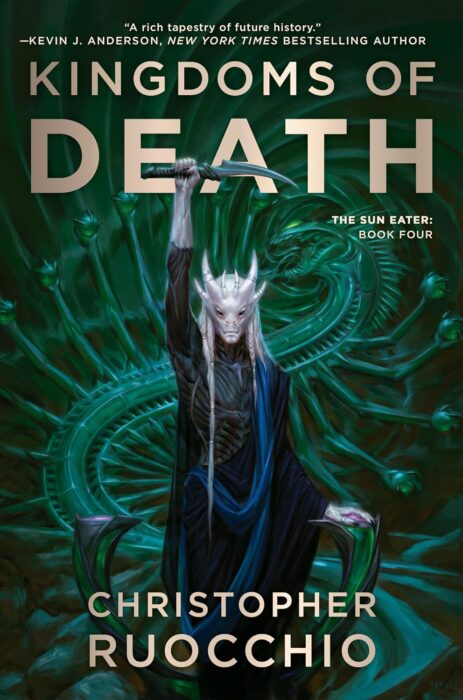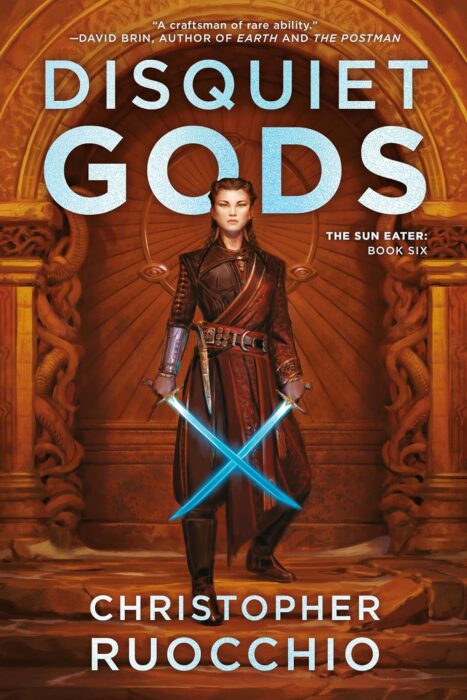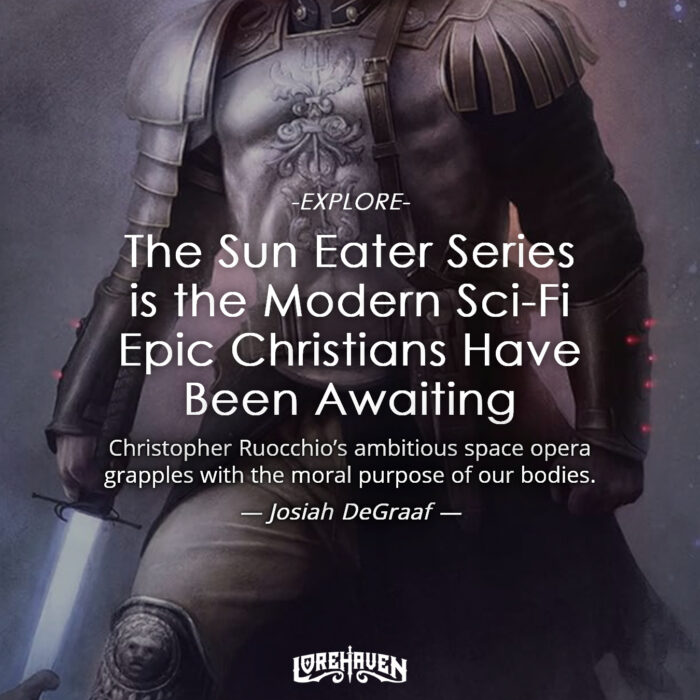The Sun Eater Series is the Modern Sci-Fi Epic Christians Have Been Awaiting
What if I told you that there’s an overtly Christian sci-fi epic that’s gone viral on TikTok, earned significant praise from secular readers, and boasts some of the most beautiful prose in modern day sci-fi?
Yet—at least in the circles I’m in—it’s not yet a series many Christian readers seem to know or be talking about.
There are reasons for that. The series isn’t marketed as Christian fiction, the overt faith elements take a while in coming, and it’s willing to go to some remarkably dark places. When you think of the novels Christian bookstores would have carried back in the day … Christopher Ruocchio’s Sun Eater series is not that.
But it’s a series that Christian sci-fi fans would be remiss in overlooking. Because this seven-book epic sci-fi couples amazing character work and worldbuilding with deep thematic questions surrounding the nature of suffering, the goodness of God, and the moral right of God to wipe out entire civilizations.
Perhaps the most notable of Ruocchio’s themes, however, has to do with the deep connection between our physical bodies and suffering.
The Sun Eater series honors the human body versus Gnosticism
Ruocchio’s series begins with Empire of Silence (released in 2018). Central to the sci-fi epic is the war of humanity against the Cielcin: an alien race that devours humans and is intent on wiping life from the universe. The story digs deeply into the motivations of this very non-human (possibly irredeemable) race. And at their core is a deep commitment to Gnostic philosophy.
 As elaborated in book 4, Kingdoms of Death, the Cielcin view the physical universe as a false reality created by a god of lies. As the villainous Syriani proclaims to our protagonist, Hadrian Marlowe:
As elaborated in book 4, Kingdoms of Death, the Cielcin view the physical universe as a false reality created by a god of lies. As the villainous Syriani proclaims to our protagonist, Hadrian Marlowe:
“Your Utannash built this world to punish us. We must destroy it, and we must destroy it. […] Its world veils the truth of the Watchers.”1
By discarding the physical world and everything in it, the Cielcin believe they’ll ascend to a higher form of knowledge.
Nor do the anti-body villains stop at the Cielcin. The villainous Lothrians rail against the evils of distinct genders. As one spokesman puts it:
“Where there is distinction, there is disparity. Where there is disparity, suffering. How shall suffering be overcome? By overcoming disparity. How shall disparity be overcome? By overcoming difference.”2
And so they create a world where men and women are turned into hermaphrodites, biological differences dissolved into an “equality” of sameness that horrifies our protagonists.
Transhumanists also get their place in the light. Various groups pursue human-technological integrations to various extents—from the Tavrosi who adopt some computer enhancements within limits, to the Extrasolarians who destroy their bodies to become one with the machines. But while Marlowe finds allies in some of these groups, he can’t shake his deep concerns with those who would destroy the body for the greater good.
While the series depicts the slippery slope of transhumanism with some nuance, the dividing lines are clear throughout the series: The human body is valuable. And villains are consistently defined by their disgust for creation’s original design.
The Sun Eater series honors human life versus terrors of suffering
This division over the natural goodness of the human body doesn’t stem from pure philosophy. For many characters, their repulsion to ordinary humanity stems from the nature of evil and suffering. If our lived experience in physical bodies results in so much pain, why not discard our human bits that cause this suffering? And so the Extrasolarians transform their bodies to escape the pain of death, the Lothrians eradicate gender to escape the pain of judgment, and the Cielcin destroy life to end the suffering God has imposed on us.
Marlowe isn’t immune to this appeal. Our protagonist goes through immense suffering throughout the series. (The fourth book, Kingdoms of Death, contains several extended torture sequences that are not for the faint of heart.) The prospect of seeking and end to his existence tempts him at various points.
Yet in a pivotal scene, where Marlowe comes closer than he ever does to choosing an end to everything, a character pushes back against him with poignant appeals to God’s nature:
“You asked why he does not end all that he has made: because the story is not yet finished, even now, and he will not end it until every bead of light has had its day.”3
 Pain is not just an event: It’s part of a larger narrative, and we can hardly reject suffering without losing our own stories in the process—and the light God carries us to. Because pain enables us to grasp that light. As Marlowe reflects at the end of the penultimate book 6, Disquiet Gods:
Pain is not just an event: It’s part of a larger narrative, and we can hardly reject suffering without losing our own stories in the process—and the light God carries us to. Because pain enables us to grasp that light. As Marlowe reflects at the end of the penultimate book 6, Disquiet Gods:
“Our experiences of pain teach us the nature of suffering, and so we are moved to minimize that suffering in others. Pain grounds our reality, is the cornerstone of our interactions with the objective world. Pain makes us human, teaches us to be human.”4
It doesn’t just teach us to be human. It makes us like God. As Marlowe reflects after a Job-like confrontation with God:
“He [God] suffered to see our suffering, and so our suffering made us more like him, who knew our every hurt.”5
To reject the pain that comes with our physical bodies is ultimately to spurn the path to virtue.
Ruocchio’s epic appeals to a hostile culture with Christian defenses of the body
This brief article barely scratches the surface of this one theme—to say nothing of the others that fill the series. But it’s noteworthy to point out the immense success this series has had with secular audiences despite its overtly Christian elements.
Non-religious BookTubers like Daniel Greene and “2 to Ramble” have spotlighted Sun Eater as one of their favorite sci-fi series. Nor are its Christian themes a downside for such reviewers. As Austin remarks in his review of Disquiet Gods, “The reason I want to believe [in God] is stories like this that are profound and encapsulate you.”6
Christians who write off the mainstream publishing space as anti-Christian and secular may miss the real impact a skilled Christian storyteller like Ruocchio is having with his defense of what truly makes us human.
I eagerly await The Sun Eater series conclusion in the final book. Shadows Upon Time releases tomorrow, Nov. 18, 2025.
Best for: Adult fans of epic fantasy/space opera.
Discern: Intense violence, body horror, disturbing torture sequences (particularly in Kingdoms of Death), swearing, and some sensual content.
- Kingdoms of Death by Christopher Ruocchio, pages 254–255. ↩
- Ibid., page 115. ↩
- Disquiet Gods by Christopher Ruocchio, page 385. ↩
- Ibid., page 671. ↩
- Ibid., page 390. ↩
- “Disquiet Gods: Spoiler-free & Spoiler Review,” 2 To Ramble on YouTube, Aug. 1, 2025. ↩































This is cool. I have heard of this series and was planning to read the first one next year. But I had no idea the author was a Christian. Now I’m even more excited to read it.
I think the “discern” footnote warrants some expansion/discussion. I read the first book and the first few chapters of the second on this review’s recommendation.
The world building presents a distant future galactic-scoped religious/feudal hierarchy with the sex and violence culture and ethics of the pagan Roman Empire.
The frame narrative positions the protagonist in that world, but the protagonist projects a contemporary-to-us worldly sexual ethic – essentially, if it’s consensual, what’s the harm? Sexual entanglements seem to be consequence free. Wives have wives, husbands have husbands. Non-consensual/power-differential abuse is disapproved of. This aspect of the writing carries the vibe of secular fresh-out-of-college level love-is-love maturity. The narration is well aware of the protagonist’s own need and desire for real and present father and mother, but awareness of human brokenness along relationship lines doesn’t seem to mature beyond that.
I was drawn into investing in the protagonists personal growth and story trajectory but the normalization of a worldly sexual ethic jarred with this sense of investment. I found I couldn’t detach sufficiently and see the character entirely as a product of his world; there were a few moments where it felt too strongly that the author himself was projecting this worldview personally through the narrative.
Swearing is fully f-word territory, violence gets graphic. Firmly R rated if it were a movie.
I felt that “Empire of Silence” wanted, through some lens, to echo another Catholic work, “Silence” by Shusaku Endo. While Endo’s feudal world is also violent, there’s a much deeper maturity and embodiment of a struggle for Christian worldview and the nature of Christ and the cross in his writing. By contrast, Ruocchio’s protagonist, at least in book 1, mainly laments his personal immature choices that got him into trouble, while those choices propel the story along. If there is ever any judgment, it is reserved for abuse of power, there is little of true depth. The second book seemed to follow in similar footsteps. There is plenty of Christian symbolism but it feels messily applied and lacking truly deeper allusions and thoughtfulness.
I really wanted to enjoy this series given the themes described in the review above. Would the reviewer @Josiah be willing to say if this series changes tone over time and grows in maturity in these particular dimensions? What did you think of these aspects of the story?
Really appreciate you sharing these thoughts, Pete! Yeah, the language & violence would definitely be R-rated. With regards to the worldly sexual ethic, I do think it’s something that’s addressed over the series as a whole, but in a more subtle way. Without trying to spoil much, I don’t think Hadrian really ever consciously rejects his society’s view of sex. He will push back against carefree sex, but doesn’t have issues with sex in the context of committed dating relationships. That being said, the series does eventually explore the pain these practices cause both Hadrian and other characters and contains a few poignant pointers to the value of marriage. So I do see this series as critiquing the society and Hadrian in this regard, but it takes a bit of reading between the lines since we’re seeing everything through Hadrian’s limited perspective.
The Christian themes do come out more prominently later on in the series than the first book. Ruocchio was actually agnostic when he wrote the first book, and I believe came to Christ between writing the first and second books. So while the first book grapples with some religious themes, you can definitely see some of the worldview shifts in later books when these themes become more prominent and handled better.
From what I’ve seen online, there are a fair number of series fans who didn’t love the first book due to Hadrian’s immaturity but really gravitated to the series after the second book. I enjoyed the first book, so Hadrian’s flaws in it didn’t bug me as much. But a lot of readers do enjoy the series a lot more after getting through the first book. You can make of that what you will for your own future reading choices. 🙂
Thanks for replying, the insight is appreciated!